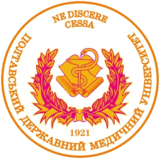Будь ласка, використовуйте цей ідентифікатор, щоб цитувати або посилатися на цей матеріал:
http://repository.pdmu.edu.ua/handle/123456789/22891| Назва: | Взаємозв’язок акушерських ускладнень з метаболічними порушеннями у жінок з ожирінням різного ступеня |
| Інші назви: | Correlation between obstetrics complications and metabolic disorders among pregnant women with various obesity grades |
| Автори: | Тарасенко, Костянтин Володимирович Tarasenko, K. V. |
| Дата публікації: | 2019 |
| Видавець: | Полтавський державний медичний університет |
| Бібліографічний опис: | Тарасенко К. В. Взаємозв’язок акушерських ускладнень з метаболічними порушеннями у жінок з ожирінням різного ступеня / К. В. Тарасенко // Вісник проблем біології і медицини. – 2019. – Вип. 2, т. 2 (151). – С. 172–176. |
| Короткий огляд (реферат): | Аналіз взаємозв’язку метаболічних змін з акушерською патологією свідчить про участь порушень обміну вуглеводів у збільшенні частоти невиношування вагітності, плацентарної дисфункції,
порушенні біоценозу пологових шляхів у жінок з ожирінням І ступеня, зростанні ролі гіпертригліцеридемії та
гіперліпопротеїнемії ІV типу у вагітних з більш тяжким ІІ ступенем ожиріння. У жінок з морбідним ожирінням
ІІІ ступеня зростання кількості взаємозв’язків порушень обміну вуглеводів та проатерогенних змін з розвитком дистресу плода під час вагітності та з асфіксією новонароджених знаходить пояснення в погіршенні енергетичного забезпечення їх організму Pregnant women with obesity have insulin resistance pathology unlike pregnant women with physiological weight, as evidenced by progression of insulin resistance depending on obesity class, gestation and increase in amount of obstetric complications. Insulin resistance pathology as initial mechanism metabolic disturbances among pregnant women with obesuty results in lack of tissue energy, contributes to system inflammation development, endothelial dysfunction and liver dysfunction, which are the pathogenetic basis of obstetric complications. We used correlation analysis to identify links between metabolic disturbances and the obstetric pathology development of pregnant women with obesity. Correlations between variables were evaluated by Spearman rank correlation coefficient (R) and Kendall rank correlation coefficient (τ). We found out that pregnant women with obesity have insulin resistance pathology and compensatory hyiperinsulinemia depending on obesity class and progressing for gestation period unlike pregnant women who have physiological weight. At class III obesity pregnancy is featured by blood glucose elevations during the late state of gestation as opposed to early state that could be the start of metabolic decompensation common to Type-2 diabetes. Decrease in cells’ sensitivitytowards insulin among pregnant women with obesity, pointed by insulin resistance altered indicators– index HOMA-JR and CARO, shows a decrease on average by 50 percent of glucose which goes into the cell through transport system GLUT-4. Under these conditions, lack of basic energy substrate – glucose, leads toincrease of triglycerides in blood, which function as energy provider, but simultaneously possess atherogenic effect and play the key role in hyperlipoproteinemia, type 4, which is characterized by a high atherogenic potential. In addition, free fatty acids are able to suspend cellular respiration process and adenosine triphosphate synthesis, i.e decrease energy production of tissue. Leptin – a hormone, which is predominantly composed of adipose cells, and a content of which increases depending on obesity level, as well as increase in “leptin/coefficient CARO” balance, show that Leptin presence decreases sensitivity of cells towards insulin for pregnant women with obesity. Linkage analysis of metabolic disorders and obstetric pathology shows correlation regarding carbohydrate exchange disorders and increase in miscarriage frequency, placental dysfunction, biocenosis disturbance of female reproductive organs with first class obesity, a growing importance of hypertrigliceridemia and hyperlipoproteinemia type 4 with a more severe 2nd class obesity. Among women with morbid 3rd class obesity class an increasing interlinkeage between carbohydrate metabolism disorders and proatherogenic changes of a growing fetus during gestation period, and the asphyxia of newborns, finds explanation in deterioration of energy supply of their organism. Therefore, metabolic disorders among pregnant women with obesity are pathogenicaly correlated with obstetric complications due to an insufficient organism’s energy supply progression, initiated by pathological insulin resistance and dislipidemia. |
| Ключові слова: | вагітність ожиріння інсулінорезистентність дисліпідемія акушерські ускладнення pregnancy obesity insulinresistance dyslipidemia obstetric complications |
| ISSN: | 2077-4214 2523–4110 |
| DOI: | 10.29254/2077-4214-2019-2-2-151-172-176 |
| URI: | http://repository.pdmu.edu.ua/handle/123456789/22891 |
| Розташовується у зібраннях: | Вісник проблем біології і медицини, Випуск 2, Том 2 (151) |
Файли цього матеріалу:
| Файл | Опис | Розмір | Формат | |
|---|---|---|---|---|
| Correlation_between_obstetrics.pdf | 157,59 kB | Adobe PDF | Переглянути/Відкрити |
Усі матеріали в архіві електронних ресурсів захищені авторським правом, всі права збережені.



